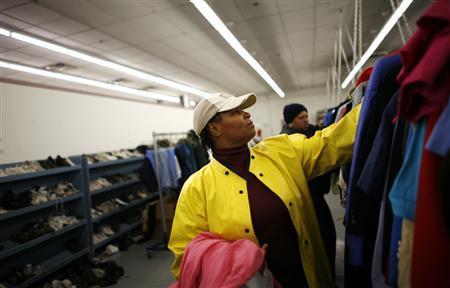Reuters
Dec 11, 2008
Americans cut back, but permanent thrift elusive
Reuters
Dec 11, 2008
By Andrea Hopkins
CINCINNATI (Reuters) - Single mother Kelly Dukes has lost her house, her car and her salary, but rather than curse the U.S. recession, the Cincinnati mom said she's grateful to have learned a whole new way to live.

"Now I understand the difference between want and need," said Dukes, 27, as she shopped for a pared-down Christmas for her 3-year-old daughter at discount retailer Target.
"I used to go shopping every other day ... but now I know I don't need the same pair of shoes in three different colors," said Dukes, who worked at a nonprofit organization helping children until it lost funding and couldn't pay her salary.
"Even though a recession is hard on people, I think maybe it'll shake a lot of people up and force them to think and educate their kids -- even if you want something, you can't always have it, and it's not important anyway."
Spending less, saving more and eschewing consumerism were out of fashion just a year ago in America, where "more" often means "better," but the loss of 1.3 million jobs in three months, foreclosures on millions of homes and the prospect of a deep recession has made thrift the new mainstream.
Dukes has cut her expenses by using public transportation, buying store brands instead of name-brand goods, looking for sales and simply buying fewer things. She moved from a huge house to a small apartment, changed to a cheaper day-care and has pledged to save more money for the next emergency.
These signs of change, backed by economic data showing U.S. consumers buying less and saving more, have excited David Blankenhorn, president of the Institute for American Values, a New York-based think tank.
"The way of thinking about money that has characterized most of us Americans for the past several decades, a debt-oriented way of thinking, spending more than we earn ... that way of thinking has come to an end," said Blankenhorn, whose 2008 book, "Thrift: A Cyclopedia," was dreamed up when the idea was a quaint throwback but published just as Americans started talking about clipping coupons again.
Data released in November showed U.S. consumer spending dropped 0.5 percent in October, its fifth straight monthly decline, while the personal saving rate climbed to 2.4 percent. That means Americans are saving $2.40 for every $100 of disposable income. As recently as April 2008, Americans were saving none of their after-tax income.
'THRIFT CULTURE?'
But even Blankenhorn is skeptical the belt-tightening represents a permanent change in American values.
"My hope is that the debt culture will be replaced by the thrift culture, but it remains to be seen," he said. "The thing about thrift is it's not just in response to necessity, but it's actually a positive value -- a wise use of resources ... not just medicine for hard times."
Economists, too, have mixed feelings about whether the dramatic drop in consumer spending and increase in the nation's saving rate are temporary or permanent.
"It's both," said Richard DeKaser, chief economist at National City Corp in Cleveland.
DeKaser said the sharp rise in saving had come because Americans feel economic insecurity -- a fear that may pass when the recession eases. But because personal assets like homes are not going to rise in value like they did during the housing boom, Americans are also going to change permanently the way they save for education or retirement.
"I see a long-term trajectory of increased savings because asset appreciation is not going to be able to provide for financial goals as it did in the past," DeKaser said, adding that people would spend less in order to save -- perhaps by driving a car for an extra year or forgoing luxuries.
Because consumer spending has traditionally accounted for as much as two-thirds of U.S. economic activity, consumption has sometimes been portrayed as patriotic, such as after the September 11 attacks when U.S. President George W. Bush urged Americans to go shopping.
If the new thrift takes hold long term and consumers do not return to spendthrift ways, economists say the United States will have to find a new engine for growth, such as exports.
'SPENDING ...THE AMERICAN WAY'
DeKaser warns against assuming the thrift consumers are now displaying will last once employment picks up again and the sense of crisis has passed.
"I think it is tempting to extrapolate the present forever into the future," DeKaser said, noting that Americans had long had a tendency to judge their own well-being by comparing themselves to friends and neighbors -- and trying to compete.
"If they view themselves as falling behind society as a whole, there is a desire to fill the gap and fill it with debt," he said. "I think there is still going to be that perceived desire to keep up with the Joneses."
For her part, Dukes said the changes she had made were permanent, because she has seen the folly of relying on material things for happiness. But she laughs when asked whether her fellow Americans will stick to tight budgets when the economy booms again.
"They'll go right back to it, all the spending," said Dukes. "That's the American way."
(Additional reporting by Mark Felsenthal in Washington; Editing by Cynthia Osterman)
© Thomson Reuters 2024 All rights reserved.


























